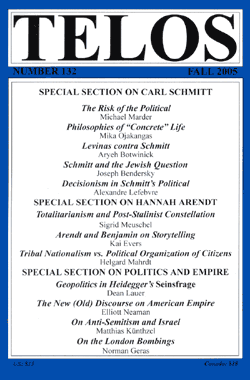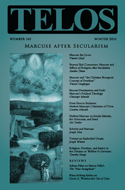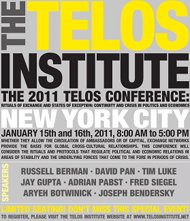By Telos Press · Tuesday, April 25, 2023 In today’s episode of the Telos Press Podcast, David Pan talks with John Milbank about his article “A Tale of Two Monsters and Four Elements: Variations of Carl Schmitt and the Current Global Crisis,” from Telos 201 (Winter 2022). An excerpt of the article appears here. In their conversation they discuss the three idioms into which Milbank divides Carl Schmitt’s thought; why they should be seen as separate idioms rather than different aspects of a single perspective; the extent of overlap between the idioms; whether the decisionist Schmitt is as arbitrary as he is made out to be; the characteristics of a medieval European conception of nomos that Schmitt wishes to retrieve; the similarities between Schmitt’s third idiom of global regions and both Nazism and Russian theorists like Gumilev, Panarin, and Dugin; Schmitt’s decisionism, basic values, identity, and thinking through popular sovereignty. If your university has an online subscription to Telos, you can read the full article at the Telos Online website. For non-subscribers, learn how your university can begin a subscription to Telos at our library recommendation page. Print copies of Telos 201 are available for purchase in our online store.
Continue reading →
By Flaminia Incecchi · Wednesday, January 4, 2017 David Pan’s “Carl Schmitt on Culture and Violence in the Political Decision” aims at challenging the widespread view that Carl Schmitt’s decisionism is motivated by violence and pure power. Pan presents his readers to “another Schmitt” that has escaped the attention of many commentators, including Müller, Žižek, McCormick, and Agamben. For Pan, Schmitt’s decision must not be separated from spiritual ideals and cultural values.
Continue reading →
By Simas Čelutka · Wednesday, January 27, 2016  Today’s world is witnessing a noticeable intensification of hostilities and confrontations on many fronts of international relations. A revisionist and neo-imperialist Russia, annexing Crimea and staging a cynical proxy war in Eastern Ukraine in 2014, is challenging the very foundations of the post–Cold War international order. The Syrian “quagmire,” which began in 2011, created a space for the emergence and gradual establishment of the so-called Islamic State (ISIS), now widely recognized as the paramount terrorist organization threatening the security architecture in the Middle East as well as Europe. Terrorist attacks in France, Egypt, Mali, Tunisia, Lebanon, and other countries have been widely and justifiably interpreted as warnings signaling that Europe (or the West in general) is unable to cope with its new enemies. The chaos and uncertainty that ensued after the flood of refugees and migrants into Europe only exacerbated the perception of weakness and unwillingness on the part of the Western leaders to tackle these challenges seriously. In this alarming context, political philosophy once again gains significance as an existential occupation. This is the reason why a re-evaluation of the controversial oeuvre of Carl Schmitt, the thinker who articulated some of the most acute criticisms of modern liberalism, is so timely. Today’s world is witnessing a noticeable intensification of hostilities and confrontations on many fronts of international relations. A revisionist and neo-imperialist Russia, annexing Crimea and staging a cynical proxy war in Eastern Ukraine in 2014, is challenging the very foundations of the post–Cold War international order. The Syrian “quagmire,” which began in 2011, created a space for the emergence and gradual establishment of the so-called Islamic State (ISIS), now widely recognized as the paramount terrorist organization threatening the security architecture in the Middle East as well as Europe. Terrorist attacks in France, Egypt, Mali, Tunisia, Lebanon, and other countries have been widely and justifiably interpreted as warnings signaling that Europe (or the West in general) is unable to cope with its new enemies. The chaos and uncertainty that ensued after the flood of refugees and migrants into Europe only exacerbated the perception of weakness and unwillingness on the part of the Western leaders to tackle these challenges seriously. In this alarming context, political philosophy once again gains significance as an existential occupation. This is the reason why a re-evaluation of the controversial oeuvre of Carl Schmitt, the thinker who articulated some of the most acute criticisms of modern liberalism, is so timely.
Continue reading →
By Joseph Diaz · Tuesday, January 21, 2014 Joseph Diaz’s “Schmitt and Marcuse: Friends, Force, and Quality” appears in Telos 165 (Winter 2013). Read the full version online at the Telos Online website, or purchase a print copy of the issue in our store.
 This article aims at exploring the potential for a politically operative theory of opposition to liberalism’s stultifying politics of process. Given their formal political positionality as critics of liberal neutrality, as well as their historically particular relationship to some of the most volatile politics of the twentieth century, Marcuse and Schmitt cannot but be brought into discourse with one another in the most pressing of times, for three reasons. First, by exploring the modalities of their respective criticisms, this article locates an enemy common to both thinkers in the neutralization of the political through the attempted elimination of the decision. Second, in using Schmitt’s framework of the friend-enemy distinction, further investigation into the potential complicities between anti-liberal thought illuminates the limitations of founding political friendship on mere enemy identification alone. This article aims at exploring the potential for a politically operative theory of opposition to liberalism’s stultifying politics of process. Given their formal political positionality as critics of liberal neutrality, as well as their historically particular relationship to some of the most volatile politics of the twentieth century, Marcuse and Schmitt cannot but be brought into discourse with one another in the most pressing of times, for three reasons. First, by exploring the modalities of their respective criticisms, this article locates an enemy common to both thinkers in the neutralization of the political through the attempted elimination of the decision. Second, in using Schmitt’s framework of the friend-enemy distinction, further investigation into the potential complicities between anti-liberal thought illuminates the limitations of founding political friendship on mere enemy identification alone.
Continue reading →
By David Pan · Monday, March 7, 2011 This paper was presented at the 2011 Telos Conference, “Rituals of Exchange and States of Exception: Continuity and Crisis in Politics and Economics.”
 When we consider the metaphysical foundations of our world, we must make a basic choice between a universal conception of metaphysics and a relativist one. This choice commits us to either of two possibilities for world order. With a universalist conception, world order will evolve through a gradual establishment of one universal metaphysical structure that will establish its universality everywhere. With the relativist conception, world order can only consist of a set of agreements and rituals that can be established between a number of separate spaces, each of which is organized according to its own metaphysical structure. The choice for one or the other of these perspectives is consequently a fundamental one that will have far-reaching consequences for our conception of politics in a global context. When we consider the metaphysical foundations of our world, we must make a basic choice between a universal conception of metaphysics and a relativist one. This choice commits us to either of two possibilities for world order. With a universalist conception, world order will evolve through a gradual establishment of one universal metaphysical structure that will establish its universality everywhere. With the relativist conception, world order can only consist of a set of agreements and rituals that can be established between a number of separate spaces, each of which is organized according to its own metaphysical structure. The choice for one or the other of these perspectives is consequently a fundamental one that will have far-reaching consequences for our conception of politics in a global context.
Continue reading →
|
|
 Today’s world is witnessing a noticeable intensification of hostilities and confrontations on many fronts of international relations. A revisionist and neo-imperialist Russia, annexing Crimea and staging a cynical proxy war in Eastern Ukraine in 2014, is challenging the very foundations of the post–Cold War international order. The Syrian “quagmire,” which began in 2011, created a space for the emergence and gradual establishment of the so-called Islamic State (ISIS), now widely recognized as the paramount terrorist organization threatening the security architecture in the Middle East as well as Europe. Terrorist attacks in France, Egypt, Mali, Tunisia, Lebanon, and other countries have been widely and justifiably interpreted as warnings signaling that Europe (or the West in general) is unable to cope with its new enemies. The chaos and uncertainty that ensued after the flood of refugees and migrants into Europe only exacerbated the perception of weakness and unwillingness on the part of the Western leaders to tackle these challenges seriously. In this alarming context, political philosophy once again gains significance as an existential occupation. This is the reason why a re-evaluation of the controversial oeuvre of Carl Schmitt, the thinker who articulated some of the most acute criticisms of modern liberalism, is so timely.
Today’s world is witnessing a noticeable intensification of hostilities and confrontations on many fronts of international relations. A revisionist and neo-imperialist Russia, annexing Crimea and staging a cynical proxy war in Eastern Ukraine in 2014, is challenging the very foundations of the post–Cold War international order. The Syrian “quagmire,” which began in 2011, created a space for the emergence and gradual establishment of the so-called Islamic State (ISIS), now widely recognized as the paramount terrorist organization threatening the security architecture in the Middle East as well as Europe. Terrorist attacks in France, Egypt, Mali, Tunisia, Lebanon, and other countries have been widely and justifiably interpreted as warnings signaling that Europe (or the West in general) is unable to cope with its new enemies. The chaos and uncertainty that ensued after the flood of refugees and migrants into Europe only exacerbated the perception of weakness and unwillingness on the part of the Western leaders to tackle these challenges seriously. In this alarming context, political philosophy once again gains significance as an existential occupation. This is the reason why a re-evaluation of the controversial oeuvre of Carl Schmitt, the thinker who articulated some of the most acute criticisms of modern liberalism, is so timely.  This article aims at exploring the potential for a politically operative theory of opposition to liberalism’s stultifying politics of process. Given their formal political positionality as critics of liberal neutrality, as well as their historically particular relationship to some of the most volatile politics of the twentieth century, Marcuse and Schmitt cannot but be brought into discourse with one another in the most pressing of times, for three reasons. First, by exploring the modalities of their respective criticisms, this article locates an enemy common to both thinkers in the neutralization of the political through the attempted elimination of the decision. Second, in using Schmitt’s framework of the friend-enemy distinction, further investigation into the potential complicities between anti-liberal thought illuminates the limitations of founding political friendship on mere enemy identification alone.
This article aims at exploring the potential for a politically operative theory of opposition to liberalism’s stultifying politics of process. Given their formal political positionality as critics of liberal neutrality, as well as their historically particular relationship to some of the most volatile politics of the twentieth century, Marcuse and Schmitt cannot but be brought into discourse with one another in the most pressing of times, for three reasons. First, by exploring the modalities of their respective criticisms, this article locates an enemy common to both thinkers in the neutralization of the political through the attempted elimination of the decision. Second, in using Schmitt’s framework of the friend-enemy distinction, further investigation into the potential complicities between anti-liberal thought illuminates the limitations of founding political friendship on mere enemy identification alone. When we consider the metaphysical foundations of our world, we must make a basic choice between a universal conception of metaphysics and a relativist one. This choice commits us to either of two possibilities for world order. With a universalist conception, world order will evolve through a gradual establishment of one universal metaphysical structure that will establish its universality everywhere. With the relativist conception, world order can only consist of a set of agreements and rituals that can be established between a number of separate spaces, each of which is organized according to its own metaphysical structure. The choice for one or the other of these perspectives is consequently a fundamental one that will have far-reaching consequences for our conception of politics in a global context.
When we consider the metaphysical foundations of our world, we must make a basic choice between a universal conception of metaphysics and a relativist one. This choice commits us to either of two possibilities for world order. With a universalist conception, world order will evolve through a gradual establishment of one universal metaphysical structure that will establish its universality everywhere. With the relativist conception, world order can only consist of a set of agreements and rituals that can be established between a number of separate spaces, each of which is organized according to its own metaphysical structure. The choice for one or the other of these perspectives is consequently a fundamental one that will have far-reaching consequences for our conception of politics in a global context. 

